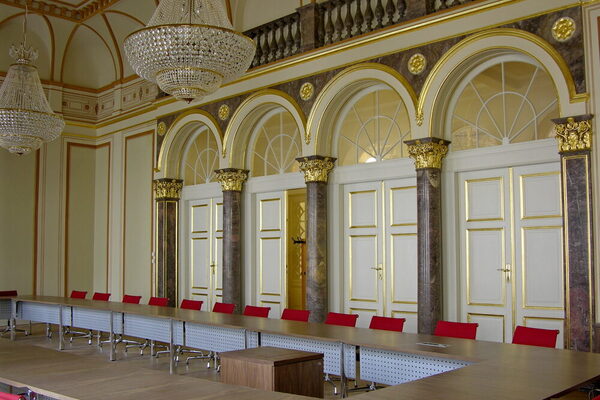Estates of the Duchy of Nassau
In contrast to many other territories, which already had estates in the Old Empire, no comparable old representative bodies were able to develop in the small-scale Nassau dominions. However, the Duchy of Nassau, established in 1806, played a special role in the contemporary development of such representative bodies. With the constitution of 1 and 2 September 1814, it was the first German state to take the step towards a state parliament organized according to the principles of constitutional monarchy, as was made binding a little later in the German Federal Act of 1815. However, it took some time before the constitutionally prescribed Nassau state parliament was convened for the first time. The inauguration took place on March 3, 1818 in a room in the old palace on the market square in Wiesbaden that had been set up as a throne room. The newly created body consisted of 34 people and was divided into two chambers. The gentlemen's bench consisted of six hereditary members and six members elected by the noble landowners. Of the 22 seats in the Chamber of Deputies, four were allocated to representatives of the churches and schools, three to representatives of the tradesmen and 15 to representatives of the bourgeois landowners. A strict census based on tax revenue applied to the electoral members of the Chamber of Deputies. As a result, only 2.2% of the adult male population had the right to vote and 0.4% had the right to stand for election.
The parliament of the revolutionary period consisted of only one chamber. Its 41 members were elected by universal, equal and secret, but indirect suffrage in accordance with the law of March 28, 1848. The original voters elected electors, who in turn elected the deputies. Women continued to be excluded from participation. With the victory of the reaction, the bicameral system also returned. The new formation, regulated in two edicts dated 25.11.1851, expanded the First Chamber, previously reserved for the nobility alone, to include the two bishops as well as six deputies from the highest-taxed landowners and three deputies from the highest-taxed tradesmen. The 24 members of the Second Chamber were elected according to an indirect three-class franchise. All male citizens aged 25 and over had the right to vote, and all male citizens aged 30 and over had the right to stand for election. In 1843/44, the Herrenbank and Chamber of Deputies moved into the new ministerial building on the corner of Bahnhofstrasse and Luisenstrasse.
The most important rights of the estates were budget and tax approval, participation in legislation and control of the administration. They were also responsible for ensuring compliance with basic civil rights, receiving petitions and advising on necessary remedies. However, the scope for action of the estates did not depend solely on their constitutional powers, but just as much on the distribution of power between parliament and government. In the Vormärz period, the duke and the government had a clear preponderance. In contrast, the representatives of the people, supported by the revolution of 1848, sought to take over the leading role. Even the reactionary turn of 1851 could only temporarily dampen the self-confidence of the estates that had been gained in the meantime. In the 1860s, the Landtag, dominated by the liberal Progressive Party, developed into a powerful opponent of the government, which was still inferior in terms of power politics, but brought the transition from a constitutional to a parliamentary monarchy within reach.
Literature
Nassau parliamentary debates. Vol. 1: Restauration und Vormärz 1818-1847, edited by Volker Eichler, Wiesbaden 1985. Vol. 2: Revolution und Reaktion 1848-1866, introduced and edited by Winfried Schüler, Wiesbaden 2010 (Veröffentlichungen der Historischen Kommission für Nassau 35/1 u. 2).
